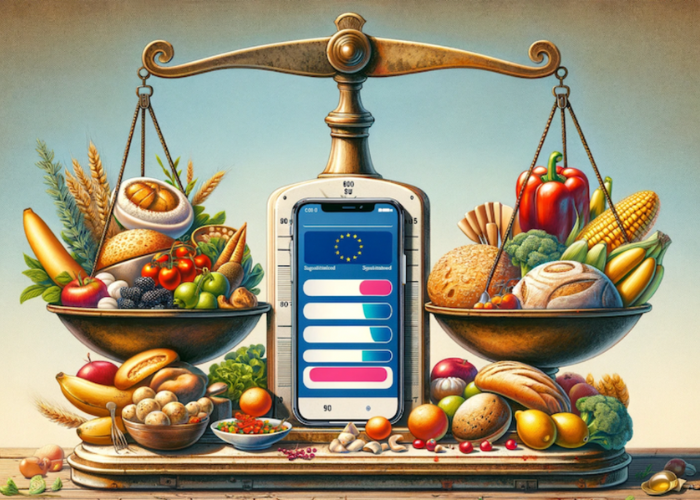Food ideology: what impact does it have?INTERVIEW WITH PIETRO PAGANINI - IL BOLLETTINO
- 16 January 2024
- Posted by: Competere
- Category: Senza categoria

President Pietro Paganini was interviewed by Edoardo Lisi regarding the issue of food policies. The interview was published in Italian in Il Bollettino, founded in 1876 by Ferdinando Bocconi and Angelo Brambilla.
You can read the full interview in Italian in Il Bollettino or find a summary below.
After enduring wars, droughts, and rising prices, a new threat emerges in the realm of food: food ideology. Will the front-of-pack labels and Nutriscore introduced by the European Union turn food into the new iPhone? “It is claimed that certain foods negatively impact health and sustainability, prompting the suggestion to eliminate them and replace them with alternatives that have a lesser impact on our bodies and the environment. There is an attempt to impose certain nutrients over others, disregarding the specific characteristics of each region. Additionally, the issue of the transition cost arises, and the industry is likely to face closures,” explains Pietro Paganini.
IPHONIZATION OF FOOD VS. FOOD DIVERSIFICATION
“This is a provocative comparison, drawing a parallel with the iPhone or similar global products in an economy of scale. The idea is that a product is sold as is, without modification to suit the tastes of each nation. This is not just because these products meet everyone’s needs, but also because there is a homogenization of taste. We see a similar trend with food, with a notable difference. While other products are promoted through marketing and a global process, in the case of food, standardization is enforced through a series of public policies falling under the umbrella of public health. This leads to the elimination of some nutrients and the imposition of new ones with global tastes and characteristics, facilitating the marketing of foods suitable worldwide. This poses a risk for local foods, such as those in the Mediterranean diet, which might be overshadowed. The tools involved include front-of-pack labels like the Nutri-score, purpose taxes, and even the concept of a planetary diet. There is an endeavor to address obesity and sustainability problems by identifying products with specific characteristics to be consumed globally as part of a planetary diet.”
HOW MUCH AWARENESS IS THERE OF NUTRISCORE IN ITALY AND THE EU?
“Italy has embraced this issue in response to the Nutriscore due to its impact on the industry. However, it has not been recognized that these policies also affect a fundamental element: freedom of choice. In essence, consumers are being directed in a specific direction through labels or taxes. Consumers should be educated to understand what they eat beyond labels that only indicate whether something is healthy or not, without providing the ‘why.’ There is a superficial understanding of the reality.”
HOW TO OVERCOME FOOD IDEOLOGY?
There is a solution: education facilitated by technological tools, such as the Internet of Things and artificial intelligence, can aid in analysis. For example, they can remind us to consume proteins and vitamins. We are moving in that direction. While unregulated use of these tools can be dangerous, they can be beneficial if properly employed. Let’s not waste time with labels and purpose taxes. Consider the sugar tax. These prohibitionist policies, even if well-intentioned, do not yield the expected results. They fail to encourage critical decision-making, learning from mistakes, and developing awareness. It is paradoxical that we spend years in school learning various subjects, yet we struggle with making informed choices. There is a significant failure in food education policies. It’s not just about the ingredient; the dose matters. Everything can be poison or not, and the key is to help 8 billion people access healthy food.”
IFOOD TO PROMOTE FREEDOM OF CHOICE
“The book aims to assist consumers in understanding the dynamics behind food choices and refocusing the role of science, which is not a source of absolute truth but rather a platform for ongoing comparison and evolution. It is a concept on which we should not adhere to ideological positions rigidly. The latest study from the Istituto Nutrizionale Carapelli emphasizes the positive impact of olive oil on physiological aspects, proving that what is observed in consumption is indeed true: Evo Oil contributes to reducing obesity. It can serve as a form of medicine in balanced doses. The challenge lies in the current low production due, in part, to climate change, resulting in increased prices and reduced consumer purchases. If it is beneficial, we should promote its production and consumption not by imposition but by developing policies that enhance productivity. The ethical aspect of marketing is also crucial. For instance, ultra-processed food typically combines five different ingredients. It’s essential to distinguish between adding an additive to preserve the product and other considerations. In Europe, certain products tend to be stigmatized, such as palm oil, which was demonized until it was recognized as the best alternative in some cases.”

